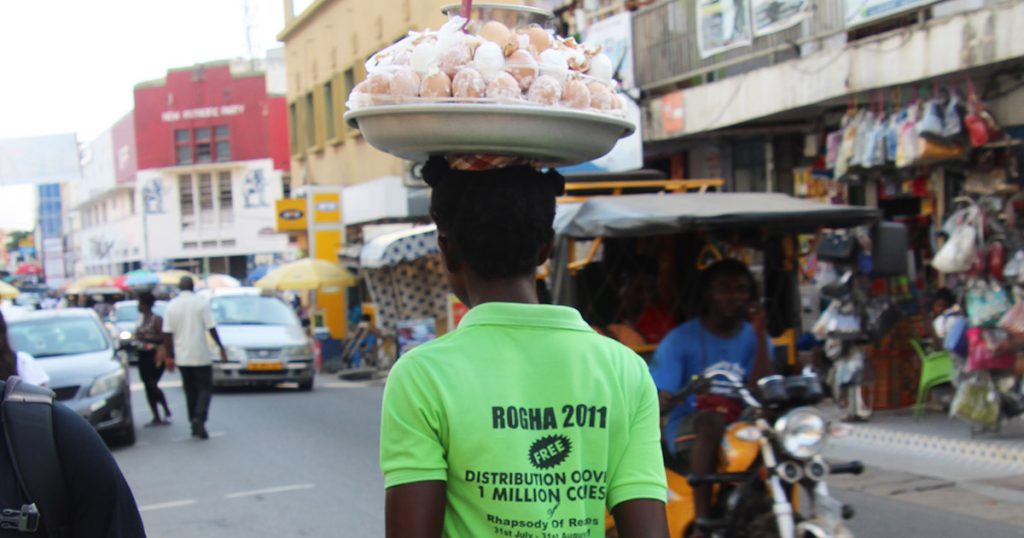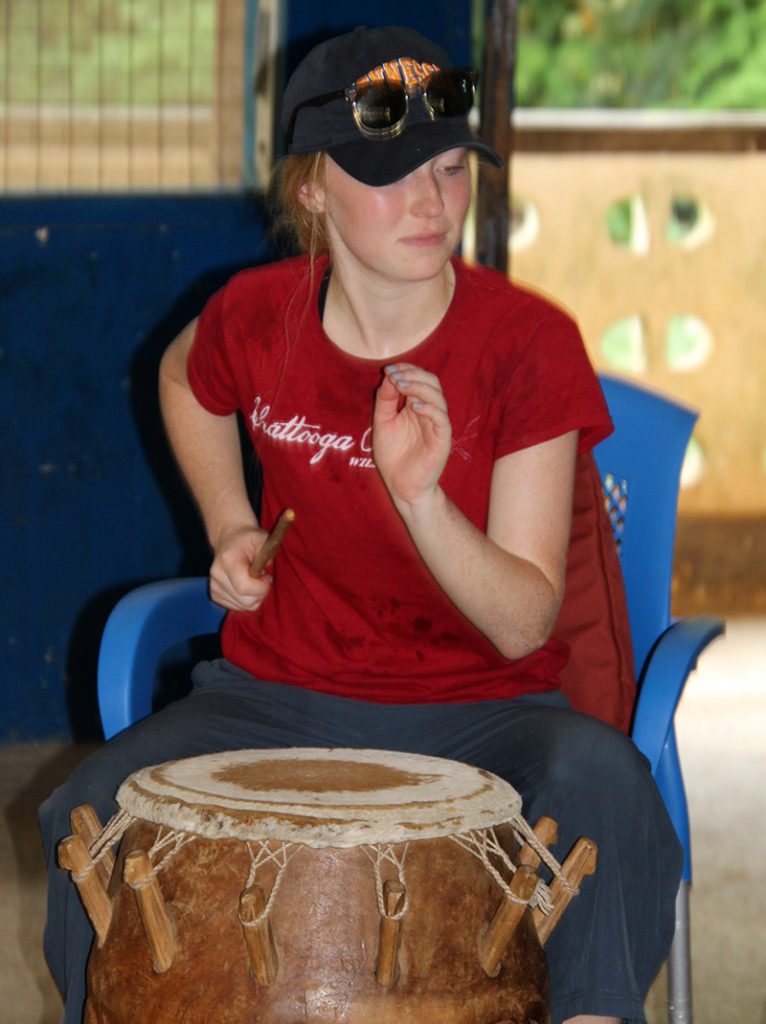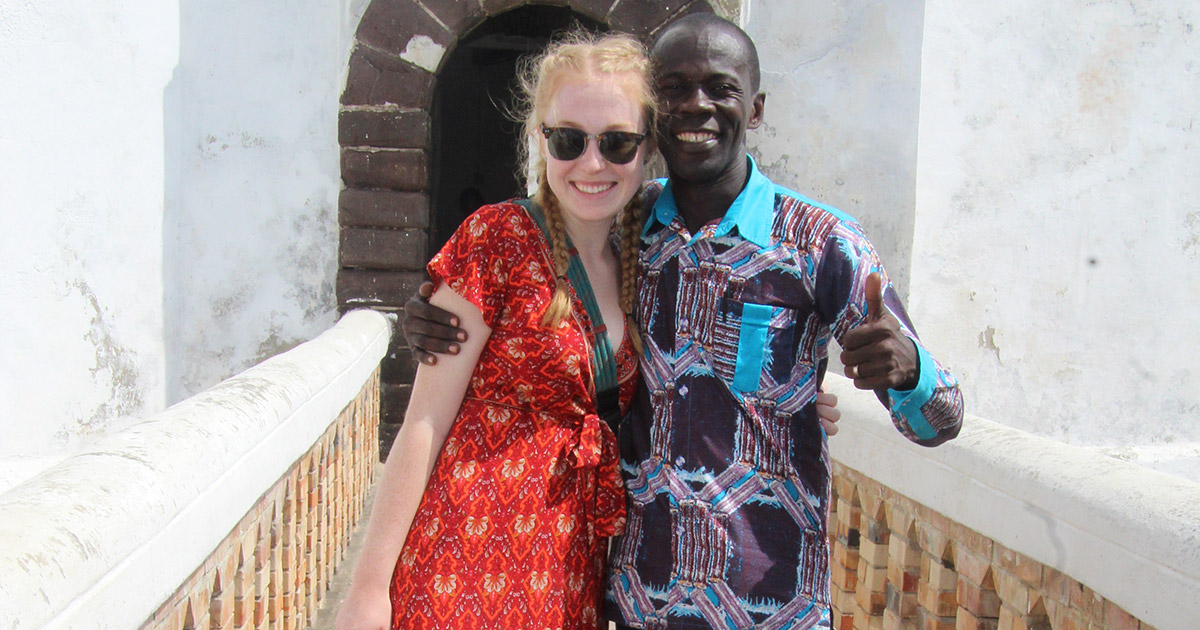Savannah Davidson: Student Report from 2019 Alternative Winter Break to Ghana
Respect. What an interesting and simple concept, yet something many countries struggle to establish and maintain within their communities. Every nation has a set of laws that keep people safe and protect one’s personal property, yet most countries still struggle with theft problems, some more so than others. Many countries with the worst theft problems have some of the highest performing economies. Why is that? Could it be a cultural thing? One of the most profound things I learned from my experiences in Ghana was the underlying and widely understood sense of respect amongst its people.
When our group first arrived in Accra, Ghana, we took a bus ride from the airport to Cape Coast where we would be staying for the duration of the trip. On this drive, we got our first taste of what the culture was like in Ghana. We saw lots of little shops along the road, people selling things in buckets on their head (“hawking”) in the street, and animals, including goats and chickens, walking around on the side of the road. It was a very interesting scene.

I was so intrigued by the livestock just aimlessly walking around the shops and grazing in small patches of grass on the side of the road, completely unattended. My instant assumption was that these animals were wild. They must be, I thought, because any number of things could happen to them while they’re out of their owner’s sight. They could wander into the street and get hit by a car, someone could steal them, etc. I was later informed that all these animals did in fact have owners. I was so shocked. If no one’s watching these goats, couldn’t someone steal them?
 One afternoon, while traveling back from visiting a primary school, our bus got a flat tire. We pulled over onto the side of the road to fix it. Some of us got out to stretch our legs and watch our hosts change the tire. There were a cluster of plantain trees by where we were standing, with a few bunches of unripe plantains hidden in their leaves. Plantain trees grow quite commonly in Ghana, almost as common as pine trees grow in the US; so, I decided I would jump up and pick a plantain off the tree for fun. Before I could do so, one of the students with me went back to the bus to ask one of our guides, Patrick, if I could pick a plantain. “Oh no I wouldn’t do that,” he said. I respected it, of course, but I was still curious as to why. “That could be someone’s tree,” Patrick said. In that moment I finally understood this underlying sense of respect that exists in Ghana. In the US, if there isn’t a law explicitly saying someone cannot do something, someone will do it. There wasn’t a sign on the tree saying I couldn’t pick a plantain, so I thought I could do whatever I wanted and just snatch one off the tree.
One afternoon, while traveling back from visiting a primary school, our bus got a flat tire. We pulled over onto the side of the road to fix it. Some of us got out to stretch our legs and watch our hosts change the tire. There were a cluster of plantain trees by where we were standing, with a few bunches of unripe plantains hidden in their leaves. Plantain trees grow quite commonly in Ghana, almost as common as pine trees grow in the US; so, I decided I would jump up and pick a plantain off the tree for fun. Before I could do so, one of the students with me went back to the bus to ask one of our guides, Patrick, if I could pick a plantain. “Oh no I wouldn’t do that,” he said. I respected it, of course, but I was still curious as to why. “That could be someone’s tree,” Patrick said. In that moment I finally understood this underlying sense of respect that exists in Ghana. In the US, if there isn’t a law explicitly saying someone cannot do something, someone will do it. There wasn’t a sign on the tree saying I couldn’t pick a plantain, so I thought I could do whatever I wanted and just snatch one off the tree.
Theft, trespassing, vandalism, and so many other petty crimes seem to be such problems in the US. As a college student, I see and hear these things happening all the time on and around campus. Every country has issues like this. However, I truly believe Ghanaians have more respect for the people around them. There aren’t signs hanging up saying “Don’t steal goats” or “Don’t pick the plantains.” It’s understood. The people have respect for each other’s belongings and have this amazing sense of community—there is not a huge desire to steal. There are many interpretations of my observations, however, the mark it left on me was so positive because of how generous and welcoming the Ghanaian people are. Our guides who so graciously accompanied us almost everywhere we went were so patient, understanding, and genuinely happy to be there and share their culture with us. The people at the worksites were so open in sharing their culture with us as well. I am so thankful to have met so many amazing people and to have experienced and seen so many beautiful things in Ghana. The underlying sense of respect in the country has left a mark on me and has taught me to be more mindful of my actions and how they impact others. The world isn’t ours for the taking, it is ours to respect and share with others.
